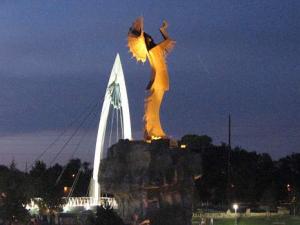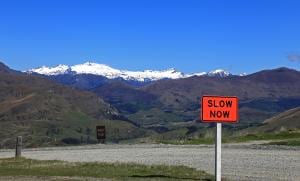Wisdom has a way of moving us.
 For much of our life, we are invested in gaining knowledge. Strike that, our entire life flows through the accumulation of knowledge. There are so many things that fit into the category of knowledge, however.
For much of our life, we are invested in gaining knowledge. Strike that, our entire life flows through the accumulation of knowledge. There are so many things that fit into the category of knowledge, however.
There is short-term knowledge like the day’s forecast or whether the Mobil station near the house has a better price on gas.
Then we have mid-term knowledge such as what’s happening next month when family comes to visit.
As you probably guessed, there is also long-term knowledge such as when your daughter will get her learner’s permit. Consequently, this is also the long-term knowledge of when you will develop your first ulcer.
Life without knowledge is at best significantly diminished and at worst completely dysfunctional.
However, knowledge operates on the economy of “yes and no.” The knowledge we have is, as far as we know, pretty concrete. We assess based on our personality, we see details based on our perspectives, and we plan to act accordingly. Knowledge and information walk hand in hand in this “economy.”
Based on the information we have, here’s what we know. The ebb and flow of knowledge leads us to black and white decisions, hope or cynicism, and in an extreme sense life or death.
As I said, much of our live exists on the line of knowledge and information. However, the whole of our life is more complex.
Some of the most interesting scenes of Jesus’ life come when he comes face to face with knowledge-driven folks.
Religious leaders bring a woman to Jesus. She blushes as she comes near, clutching a ragged blanket that covers her nakedness. She was “caught in the act of adultery.” In the realm of information and knowledge, adultery is a piece of information and knowledge. There is a certain set of circumstances that define “adultery” and a certain punishment that comes with the offense.
The offender stands in front of her peers. They throw stones at her until she is dead. Take a moment and think about that. How close to a person do you have to be, for how long, and what kind of arm strength does it take to kill a person with rocks?
Knowledge leads to a conclusion: she committed adultery. We caught her. Everyone knows what comes next. Their question to Jesus is very simple:
Is God’s law important enough to you, dear to your heart, that you would support this consequence?
Jesus lives in a different stream, a different flow. He has the knowledge and tunes into it on multiple occasions.
Yet this story is different.
Knowledge is not our only asset in the journey of spiritual growth and formation.
Jesus’ hope for us is that we build on knowledge in a way that cultivates wisdom.
There’s no other way to interpret Jesus’ response to the religious leaders’ challenge. Either he is dismissing the law that everyone knows came from God himself, or he is dismissing the marginalized people with whom he lives and for whom he advocates.
As usual, Jesus chooses the third way. He turns the discussion towards the accusers.
“What about you? If you’re clean, go ahead and fire away.”
This seems unwise, knowing that there had to be one arrogant cat in that bunch who thought, “Yep. I’m solid. Hand me that rock.”
Jesus’ Wisdom operates differently however. Wisdom doesn’t make life an issue of “or else” but instead welcomes us to live in the way of “so that.”
“Or else” says we maintain our faith and commitment to avoid consequences, such as stoning.
“So that” says we live on the basis of faith because the end result is a beautiful, beautiful way of life.
One is based on aversion, the other is based on vision.
Jesus constantly pointed people towards a life of wisdom because he knew that the potential for thriving is best when we are looking for responses, not answers.
Vision is when we hunt for the way forward to a better and more beautiful life with God, rather than resting the issue with a conversation-conquering statement.
Answers give factual statements that don’t always see the bigger picture. The answer of “What do we do with adulterers?” was clear, but it ignored the bigger picture of how women were treated as property.
The whole John 8 scenario is built on the premise that women were used as pawns to trick, trap, and trample the one whom the religious leaders feared most.
It is interesting: wisdom often leads to freedom and grace, but it also petrifies those for whom answers equal power.
Wisdom shares knowledge, it doesn’t hoard it.
The way of wisdom is Jesus responding to a lawyer’s question about the greatest of the commandments with “What do you read?” rather than, “Well, I have three points…”
No one standing around the scene in John 8, from the marketplace pickpockets to the Roman soldiers, the man on the corner halfway through his cigarette and the commuter on their way to the office – no one was surprised at the scene.
What shocked them, captivated them, and in some sense converted them was the fresh wind of wisdom.
Perhaps this post seems a little disconnected to you. It does to me, honestly. However there is something in me that longs for wisdom more than knowledge, responses more than answers.
My hope is that something here in this wandering commentary brings you to ask questions about your own relationship with the wisdom of God through Jesus.
- Where is God inviting you to take your knowledge into account but act based on what is wise?
- Is there a place today where you have a right to something, but to claim it based on that right would be unwise?
- How does this day change if you live by “so that” rather than “or else”?
(Photo by Davide Cantelli on Unsplash)
*For more on wisdom, check out the chapter on Moses’ memories in Deuteronomy in my new book, “As I Recall: Discovering the Place of Memories in the Spiritual Life.”











